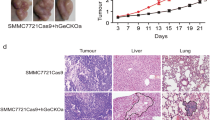Abstract
Genome editing approach based on prokaryotic CRISPR (clustered regularly interspaced short palindromic repeats) system is a simple and useful way to investigate gene functions on a genome-wide scale. It is especially important for cancer research because of genetic contribution to tumor development. We applied this technique in a high-throughput screening format to find genes that could be involved in chemotherapy resistance of pancreatic cancer. We used AsPC1 cell line expressing doxycycline-inducible Cas9 to screen two sgRNA lentiviral libraries: (1) cell cycle genes (CC, 983 genes, ∼12,000 sgRNA) and (2) genome-wide (GW, ∼90,000 sgRNA). These sets of cells with different gene knockouts were treated with oxaliplatin to identify knockouts which increase sensitivity to the drug. We have performed screening both in vitro and in vivo settings. For the in vivo arm of our experiments, peritoneal carcinomatosis model in severe combined immunodeficiency (SCID) mice was created by intraperitoneal injection of AsPC1/Cas9 cells infected with sgRNA library. Genomic DNA from cells and animal tumor material was analyzed using next generation sequencing (NGS) to obtain data about representation of sgRNA. Preliminary data allowed us to identify genes potentially modulating oxaliplatin sensitivity.


Similar content being viewed by others
References
Long, J., Zhang, Y., Yu, X., et al. (2011). Overcoming drug resistance in pancreatic cancer. Expert Opinion on Therapeutic Targets, 15(7), 817–828.
Burris, H. A., 3rd, Moore, M. J., Andersen, J., et al. (1997). Improvements in survival and clinical benefit with gemcitabine as first-line therapy for patients with advanced pancreas cancer: a randomized trial. Journal of Clinical Oncology, 15(6), 2403–2413.
Conroy, T., Desseigne, F., Ychou, M., et al. (2011). FOLFIRINOX versus gemcitabine for metastatic pancreatic cancer. The New England Journal of Medicine, 364(19), 1817–1825. doi:10.1056/NEJMoa1011923.
Jinek, M., Chylinski, K., Fonfara, I., Hauer, M., Doudna, J., Charpentier, E. (2012). Programmable dual-RNA-guided DNA endonuclease in adaptive bacterial immunity. Science, 337, 816–821.
Cong, L., Ran, A., Cox, D., et al. (2013). Multiplex genome engineering using CRISPR/Cas systems. Science, 339, 819–823.
Chen, S., Sanjana, N., et al. (2015). Genome-wide CRISPR screen in a mouse model of tumor growth and metastasis. Cell, 160, 1246–1260.
Wang, T., Wei, J., Sabatini, D., Lander, E. (2014). Genetic screens in human cells using the CRISPR/Cas9 system. Science, 343(6166), 80–84. doi:10.1126/science.1246981.
Shalem, O., Sanjana, N., Hartenian, E., et al. (2013). Genome-scale CRISPR-Cas9 knockout screening in human cells. Science, 343, 84–87.
Parnas, O., Jovanovic, M., Eisenhaure, T., et al. (2015). A genome-wide CRISPR screen in primary immune cells to dissect regulatory networks. Cell, 162, 675–686.
Bartz, S., Zhang, Z., Burchard, J., et al. (2006). Small interfering RNA screens reveal enhanced cisplatin cytotoxicity in tumor cells having both BRCA network and TP53 disruptions. Molecular and Cellular Biology, 26(24), 9377–9386.
Acknowledgments
This study was supported by the Russian Science Foundation (project 15–15–20032).
Author information
Authors and Affiliations
Corresponding author
Ethics declarations
All experiments were performed according to protocols approved by the FCCC institutional animal use committee and Ethic committee of Kazan Federal University.
Rights and permissions
About this article
Cite this article
Skripova, V., Serebriiskii, I., Abramova, Z. et al. CRISPR/Cas9 Technique for Identification of Genes Regulating Oxaliplatin Resistance of Pancreatic Cancer Cell Line. BioNanoSci. 7, 97–100 (2017). https://doi.org/10.1007/s12668-016-0272-3
Published:
Issue Date:
DOI: https://doi.org/10.1007/s12668-016-0272-3




